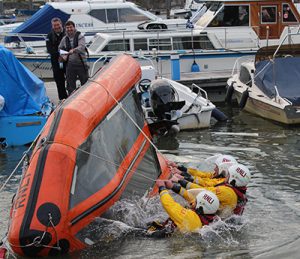RNLI: Local Lifesavers
 In the small coastal town of Burry Port in Wales, holidaymakers often wait for the tide to sweep out to reveal huge inviting beaches, perfect for a picnic or seaside stroll. But all too often, after they have made their way down to enjoy the sands, that same tide sweeps back in to leave them stranded, high and dry, on sand bars and rocks.
In the small coastal town of Burry Port in Wales, holidaymakers often wait for the tide to sweep out to reveal huge inviting beaches, perfect for a picnic or seaside stroll. But all too often, after they have made their way down to enjoy the sands, that same tide sweeps back in to leave them stranded, high and dry, on sand bars and rocks.
Luckily for them, help is at hand. A small lifeboat is available to come speeding across the estuary waters to pluck them to safety – and that little life saver comes all the way from Walsall… with love.
Walsall may not be somewhere you readily associate with the sea, but generous local people have splashed out to help make life a little safer for the small Welsh town. In fact, the people of Walsall have raised an estimated £500,000 for the national lifeboat charity in 60 years of fundraising.
And the most obvious beneficiary of that generosity is the town of Burry Port, just to the west of Llanelli – where two lifeboats can be found that were paid for by private donations from Walsall.
“Walsall has bought two boats, one in 2003 and one in 2011, which are still in use,” explained branch treasurer Phil Martin.
“The first one was paid for by a local family and named after their grandchildren – it’s called ‘the Young Watsons’ – and the second was paid for by a gentleman from Bloxwich and called the ‘Diane Hilary’.
“They are both based at Burry Port lifeboat station. The older boat is used more for training exercises these days, allowing crews to learn how to deal with capsizes, but they are both in use all the time.”
Walsall’s link with Burry Port came about after the RNLI suggested a number of places that were in need of a new boat and the Welsh coastal town was selected. Ever since, there has been an association between the Black Country and the lifeboats of Burry Port.
The two boats provided by Walsall fundraisers are technically ‘inland’ vessels. Burry Port sits on the wide, tidal estuary of the River Loughor, where low tides leave vast expanses of inviting beaches.
The small Walsall-funded craft are kept busy rescuing unsuspecting holiday makers who have become stranded on sandbanks or rocks.
“The RNLI even let you know when a lifeboat you have helped pay for is used, so you can see your fundraising at work,” explained Phil, who has been volunteering his time to the charity for 35 years.
In fact, in 2018 the boat named Diane Hilary was launched 44 times, helping 57 people – the third highest of the 15 stations in the Wales and West area. Walsall’s little boat has come to the aid of a lot of people.
“Walsall people have been incredibly generous over the years, but we want to appeal for them to keep supporting us,” Phil said.
“There are 348 lifeboats out there, including the relief fleet which is needed when craft get damaged or need repairs. They are spread across 238 lifeboat stations, so there is always the need for more funding.”
The Walsall branch hold all kinds of events throughout the year to raise funds.
“We hold a fundraising lunch in January, a flag day in Walsall town centre in April, another flag day in Aldridge in September, a coffee morning in March and then an Autumn coffee morning in October. On top of that we have a May Day skittle evening in May, and in October we have a fish supper too. There is always something going on to raise money.”
While it may seem odd that people in landlocked towns like Walsall fund lifeboats, Phil is keen to point out that these lifesaving craft also help people away from the coast.
“Most people don’t realise this, but around 45% of flood rescues are carried out by RNLI boats too,” he said.
“Lifeboat crews are trained in fast water rescue and can be called upon within a couple of hours to go anywhere in the country and help after a flood. If necessary, a lifeboat can be sent from one of the depots, and the crew will meet it at a flood site inland. It’s a part of the work lifeboat crews do that tends to go unreported.”




